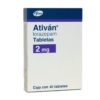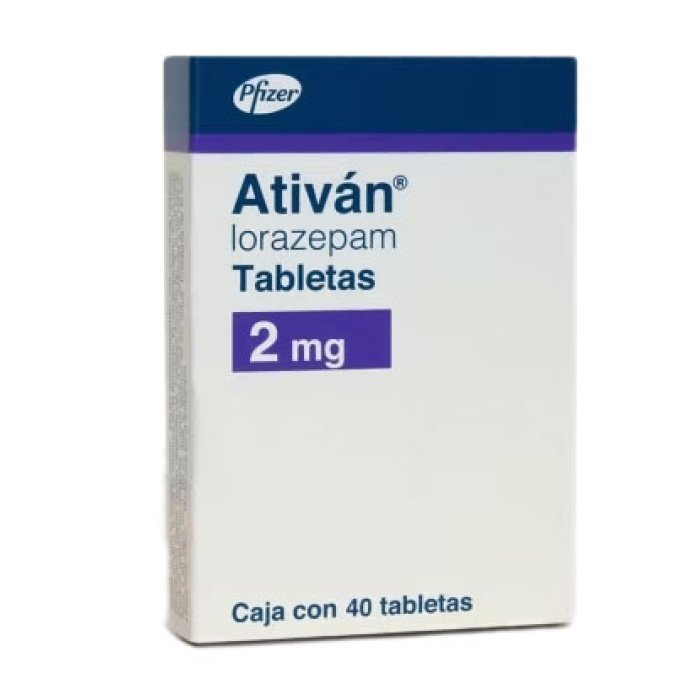Ativan 2mg
$274.00 – $499.00
Compare+1 (862) 505-1407 Start Live Chat
Description
What is Ativan 2mg?
Ativan, known generically as Lorazepam, is classified as a benzodiazepine medication. This drug is primarily utilized for its anxiolytic properties, making it particularly effective in the treatment of anxiety disorders. Aside from anxiety, Ativan is also prescribed for the management of insomnia, as well as for seizure disorders, muscle spasms, and specific cases of nausea and vomiting related to chemotherapy. The versatility of this medication stems from its ability to produce rapid calming effects, often making it a preferred choice for short-term relief of acute anxiety symptoms.
The mechanism of action for Ativan is largely centered around its interaction with GABA (gamma-aminobutyric acid), a natural chemical in the brain. By enhancing GABA’s effects, Ativan promotes a sense of relaxation and tranquillity. This sedation effect can be helpful for patients who struggle with sleep disturbances or feelings of overwhelming anxiety. Although effective, the use of Ativan does come with certain risks and side effects, which should be taken into account when considering treatment options.
Ativan is available in various dosage forms, including oral tablets, injectable forms, and as a sublingual formulation. The 2mg strength is a common dose prescribed for conditions such as anxiety and acute stress reactions. However, dosing can vary based on individual circumstances, and it must be aligned with medical guidance to ensure optimal therapeutic outcomes while minimizing potential dependencies or adverse effects.
In conclusion, Ativan serves as a critical medication within the benzodiazepine class, catering to patients dealing with anxiety-related conditions and insomnia. By understanding its classification, usage, and effects, patients can make informed decisions regarding their treatment options.
Uses of Ativan 2mg
Ativan, or lorazepam, is a medication belonging to the benzodiazepine class, primarily utilized for its sedative and anxiolytic properties. The 2mg dosage of Ativan is commonly prescribed in various clinical settings for several key medical uses. One of the most prevalent applications of Ativan 2mg is in the treatment of anxiety disorders. It functions by enhancing the effects of a natural chemical in the body known as gamma-aminobutyric acid (GABA), which helps to induce a calming effect, thus alleviating symptoms of anxiety and promoting relaxation.
Additionally, Ativan is often administered as a sedative prior to surgical procedures. Its use in this context assists in reducing preoperative anxiety and ensures that patients can undergo necessary interventions with greater comfort. The calming effects of Ativan help to relax both the mind and body, contributing to a more favorable surgical experience. Moreover, Ativan 2mg plays a vital role in the management of seizure disorders, including acute seizure episodes. By modulating neurotransmitter pathways, Ativan helps to stabilize neuronal activity and mitigate seizure occurrences, making it an essential option in emergency and ongoing management scenarios.
It is crucial, however, to recognize that Ativan should only be prescribed under the guidance of a qualified healthcare provider. A thorough assessment of an individual’s medical history, symptoms, and potential drug interactions is essential to determine the appropriateness of Ativan as a treatment option. Ensuring patient safety and optimizing therapeutic outcomes necessitate that Ativan be utilized judiciously and within the strict parameters set by healthcare professionals, thereby reinforcing its efficacy as a treatment modality when used correctly.
Potential Side Effects and Risks
Ativan 2mg, a medication belonging to the benzodiazepine class, is often prescribed for the management of anxiety and other conditions. While it can be effective, it is crucial to understand the potential side effects and risks associated with its use. Common side effects include drowsiness, dizziness, and a general sense of fatigue, which may impair daily functioning and affect decision-making abilities. Users may experience cognitive impairment, which can manifest as confusion or difficulties with concentration, particularly during the initial stages of treatment or when dosage adjustments are made.
More serious risks are also associated with Ativan. One significant concern is the development of dependency, which can occur even with short-term use. Patients may find themselves reliant on the medication for everyday functioning, leading to an increased dosage over time to achieve the same therapeutic effects. This dependency can trigger withdrawal symptoms if the medication is abruptly discontinued. Withdrawal symptoms range from mild anxiety and restlessness to severe reactions like seizures, which necessitates a cautious approach when tapering off the medication.
Interactions with other medications can further complicate the safety profile of Ativan. It is essential that patients disclose all medications they are taking, including over-the-counter drugs and herbal supplements, to their prescribing physician. The combination of Ativan with certain antidepressants, opioids, or alcohol can greatly enhance the sedative effects, leading to respiratory depression, excessive sedation, or even fatal overdose in extreme cases.
Given these potential side effects and risks, medical supervision is vital when using Ativan. Regular consultations with healthcare professionals can help monitor its effects, manage any side effects, and prevent complications, ensuring a safe therapeutic experience for those who require this medication.
Long-term Use Considerations
The long-term use of Ativan (lorazepam) raises several important considerations that patients and healthcare providers should be aware of. One significant concern is the development of tolerance, which occurs when the body becomes accustomed to the medication’s effects over time. As tolerance builds, individuals may find that they require higher doses of Ativan to achieve the same therapeutic effects, which can lead to increased consumption and greater risk of side effects.
Another critical issue associated with prolonged Ativan use is the potential for dependency and addiction. Benzodiazepines, including Ativan, have the potential for misuse, particularly among individuals with a history of substance use disorders. This risk necessitates careful monitoring by healthcare professionals to ensure safe usage. Regular assessments of the necessity of continuing the medication can help mitigate these risks.
If long-term treatment is required, patients should engage in discussions with their healthcare provider regarding the best strategies for tapering off Ativan when appropriate. A gradual reduction in dosage can help minimize withdrawal symptoms that may occur upon discontinuation. Abrupt cessation can lead to serious complications, including seizures and heightened anxiety; therefore, a well-structured tapering plan is essential.
It is also crucial for individuals using Ativan over an extended period to maintain consistent communication with their healthcare provider. Regular consultations allow for timely evaluations of efficacy, side effects, and overall mental health status. Additionally, patients may be evaluated for alternative treatment options, as well as the integration of non-pharmacological therapies, which can provide significant benefits and reduce reliance on medication. Maintaining an open dialogue with health professionals is key to responsible long-term management of Ativan use.
Alternatives to Ativan 2mg
Ativan, the brand name for lorazepam, is often prescribed for anxiety and insomnia. However, due to potential risks associated with benzodiazepines, such as dependency and withdrawal symptoms, many individuals seek alternatives to Ativan 2mg. A comprehensive range of options exists, both pharmacological and non-pharmacological, tailored to address anxiety and sleep disorders effectively.
Among medication alternatives, selective serotonin reuptake inhibitors (SSRIs) are frequently recommended. SSRIs, including fluoxetine and sertraline, target the brain’s serotonin levels and are commonly used to treat anxiety and depressive disorders. These medications tend to have a better safety profile, as they are less likely to lead to addiction compared to Ativan. Additionally, non-benzodiazepine sleep aids, such as zolpidem and eszopiclone, offer alternative solutions for insomnia without the same risks of dependency associated with benzodiazepines.
In addition to pharmaceutical options, there are various non-pharmacological strategies that can be employed. Cognitive Behavioral Therapy (CBT) is a highly effective therapeutic approach for anxiety management, focusing on altering negative thought patterns and behaviors. Mindfulness meditation and relaxation techniques can also significantly alleviate anxiety symptoms and improve overall well-being.
Lifestyle modifications, such as regular exercise, adequate sleep hygiene, and a balanced diet, further contribute to better mental health and reduced anxiety levels. Incorporating stress management techniques, such as yoga or deep breathing exercises, can also enhance relaxation and emotional regulation.
Holistic methods, including herbal supplements like valerian root and chamomile, may provide natural calming effects that can aid in sleep and anxiety management. It is essential for individuals to consult healthcare professionals before pursuing these alternatives, ensuring that the chosen method aligns with their specific health needs and conditions.
Additional information
| Pills | 180, 60, 90 |
|---|






Reviews
There are no reviews yet.